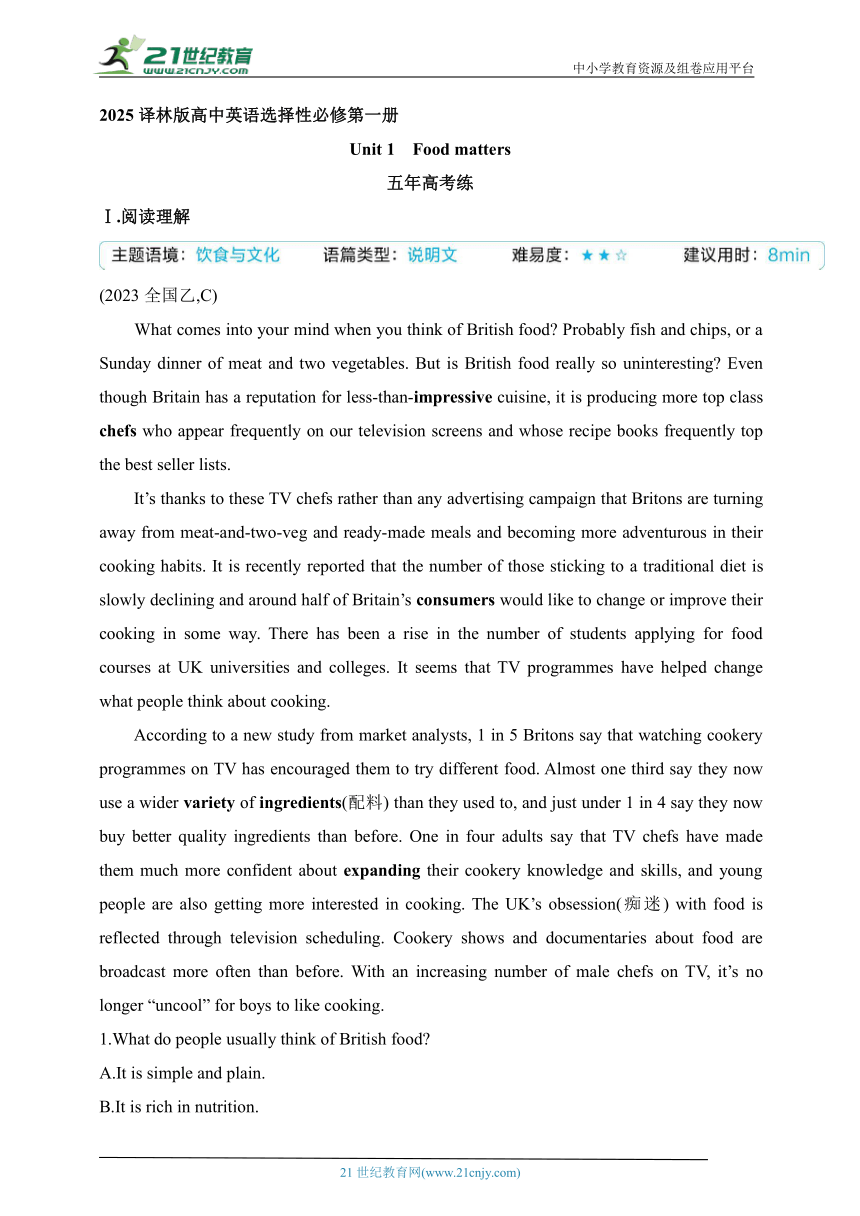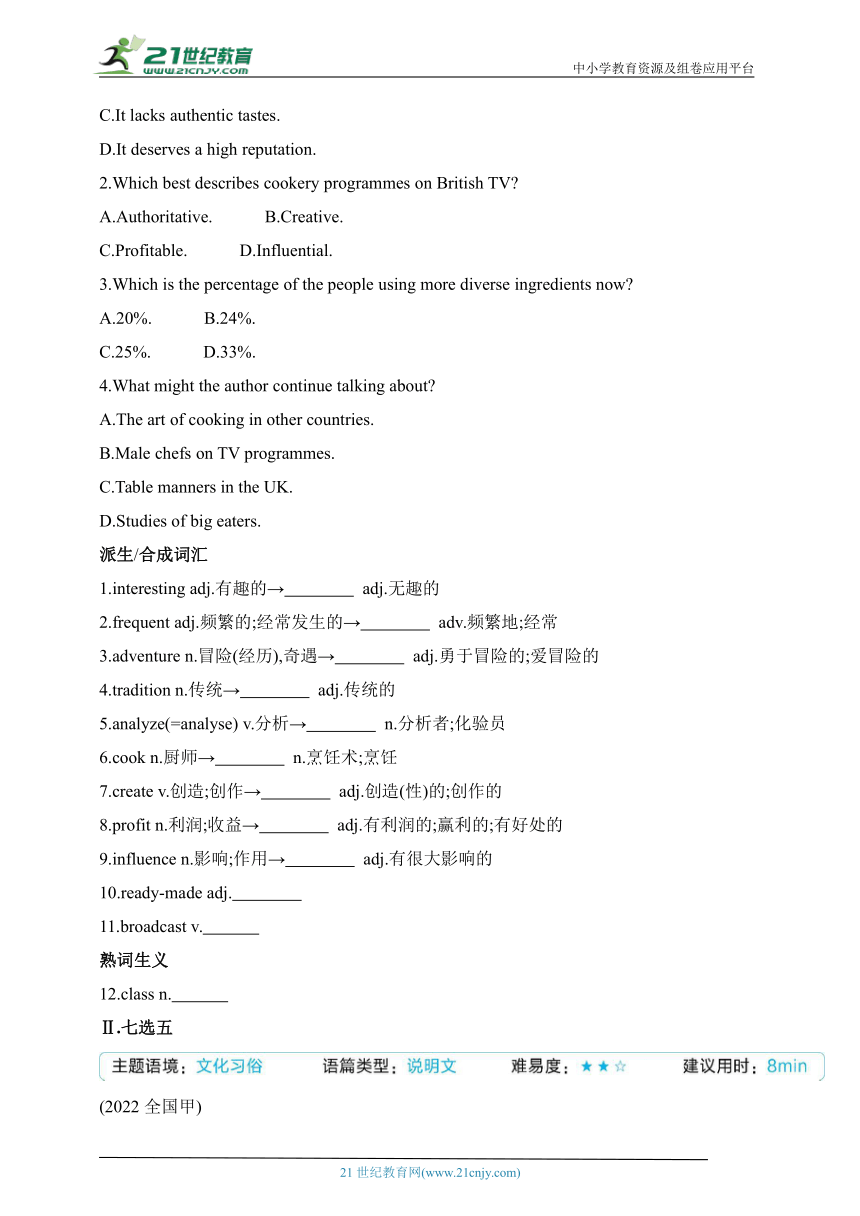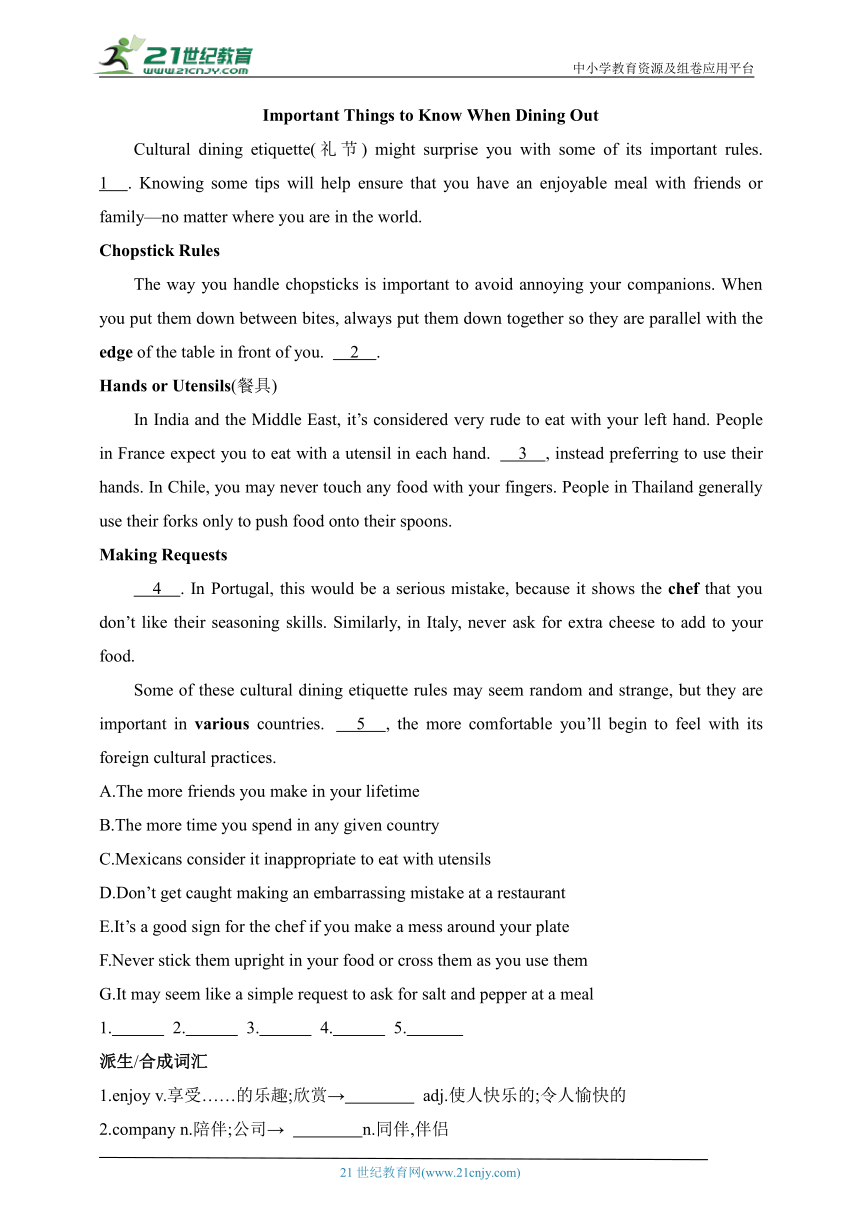2025译林版高中英语选择性必修第一册同步练习题--Unit 1 高考练(含答案与解析)
文档属性
| 名称 | 2025译林版高中英语选择性必修第一册同步练习题--Unit 1 高考练(含答案与解析) |  | |
| 格式 | docx | ||
| 文件大小 | 322.8KB | ||
| 资源类型 | 试卷 | ||
| 版本资源 | 牛津译林版(2019) | ||
| 科目 | 英语 | ||
| 更新时间 | 2024-06-05 16:16:10 | ||
图片预览



文档简介
中小学教育资源及组卷应用平台
2025译林版高中英语选择性必修第一册
Unit 1 Food matters
五年高考练
Ⅰ.阅读理解
(2023全国乙,C)
What comes into your mind when you think of British food Probably fish and chips, or a Sunday dinner of meat and two vegetables. But is British food really so uninteresting Even though Britain has a reputation for less-than-impressive cuisine, it is producing more top class chefs who appear frequently on our television screens and whose recipe books frequently top the best seller lists.
It’s thanks to these TV chefs rather than any advertising campaign that Britons are turning away from meat-and-two-veg and ready-made meals and becoming more adventurous in their cooking habits. It is recently reported that the number of those sticking to a traditional diet is slowly declining and around half of Britain’s consumers would like to change or improve their cooking in some way. There has been a rise in the number of students applying for food courses at UK universities and colleges. It seems that TV programmes have helped change what people think about cooking.
According to a new study from market analysts, 1 in 5 Britons say that watching cookery programmes on TV has encouraged them to try different food. Almost one third say they now use a wider variety of ingredients(配料) than they used to, and just under 1 in 4 say they now buy better quality ingredients than before. One in four adults say that TV chefs have made them much more confident about expanding their cookery knowledge and skills, and young people are also getting more interested in cooking. The UK’s obsession(痴迷) with food is reflected through television scheduling. Cookery shows and documentaries about food are broadcast more often than before. With an increasing number of male chefs on TV, it’s no longer “uncool” for boys to like cooking.
1.What do people usually think of British food
A.It is simple and plain.
B.It is rich in nutrition.
C.It lacks authentic tastes.
D.It deserves a high reputation.
2.Which best describes cookery programmes on British TV
A.Authoritative. B.Creative.
C.Profitable. D.Influential.
3.Which is the percentage of the people using more diverse ingredients now
A.20%. B.24%.
C.25%. D.33%.
4.What might the author continue talking about
A.The art of cooking in other countries.
B.Male chefs on TV programmes.
C.Table manners in the UK.
D.Studies of big eaters.
派生/合成词汇
1.interesting adj.有趣的→ adj.无趣的
2.frequent adj.频繁的;经常发生的→ adv.频繁地;经常
3.adventure n.冒险(经历),奇遇→ adj.勇于冒险的;爱冒险的
4.tradition n.传统→ adj.传统的
5.analyze(=analyse) v.分析→ n.分析者;化验员
6.cook n.厨师→ n.烹饪术;烹饪
7.create v.创造;创作→ adj.创造(性)的;创作的
8.profit n.利润;收益→ adj.有利润的;赢利的;有好处的
9.influence n.影响;作用→ adj.有很大影响的
10.ready-made adj.
11.broadcast v.
熟词生义
12.class n.
Ⅱ.七选五
(2022全国甲)
Important Things to Know When Dining Out
Cultural dining etiquette(礼节) might surprise you with some of its important rules. 1 . Knowing some tips will help ensure that you have an enjoyable meal with friends or family—no matter where you are in the world.
Chopstick Rules
The way you handle chopsticks is important to avoid annoying your companions. When you put them down between bites, always put them down together so they are parallel with the edge of the table in front of you. 2 .
Hands or Utensils(餐具)
In India and the Middle East, it’s considered very rude to eat with your left hand. People in France expect you to eat with a utensil in each hand. 3 , instead preferring to use their hands. In Chile, you may never touch any food with your fingers. People in Thailand generally use their forks only to push food onto their spoons.
Making Requests
4 . In Portugal, this would be a serious mistake, because it shows the chef that you don’t like their seasoning skills. Similarly, in Italy, never ask for extra cheese to add to your food.
Some of these cultural dining etiquette rules may seem random and strange, but they are important in various countries. 5 , the more comfortable you’ll begin to feel with its foreign cultural practices.
A.The more friends you make in your lifetime
B.The more time you spend in any given country
C.Mexicans consider it inappropriate to eat with utensils
D.Don’t get caught making an embarrassing mistake at a restaurant
E.It’s a good sign for the chef if you make a mess around your plate
F.Never stick them upright in your food or cross them as you use them
G.It may seem like a simple request to ask for salt and pepper at a meal
1. 2. 3. 4. 5.
派生/合成词汇
1.enjoy v.享受……的乐趣;欣赏→ adj.使人快乐的;令人愉快的
2.company n.陪伴;公司→ n.同伴,伴侣
3.general adj.普遍的;一般的→ adv.普遍地;通常;大概
4.similar adj.类似的→ adv.相似地;同样
5.comfort n.舒服,舒适;安慰→ adj.令人舒适的
6.appropriate adj.合适的;恰当的→ adj.不适当的;不合适的
7.embarrass v.使窘迫,使尴尬→ adj.令人尴尬的;使人难堪的
8.upright adv.
熟词生义
9.season v.
答案与分层梯度式解析
Unit 1 Food matters
五年高考练
Ⅰ.◎语篇解读 本文是一篇说明文。文章介绍了英国的电视烹饪节目对英国人的饮食习惯产生了巨大的影响,激发了人们对烹饪的兴趣。
1.A 细节理解题。根据第一段中“But is British food really so uninteresting Even though Britain has a reputation for less-than-impressive cuisine”可知,人们通常认为英国食物不太让人感兴趣,给人的印象不那么深刻,即简单和普通。故选A项。
2.D 推理判断题。根据第二段中“It’s thanks to these TV chefs rather than any advertising campaign that Britons are turning away from meat-and-two-veg and ready-made meals and becoming more adventurous in their cooking habits.”及“It seems that TV programmes have helped change what people think about cooking.”可知,电视烹饪节目上的厨师们让英国人对传统的“一荤两素”和现成餐食失去兴趣,并开始在烹饪习惯上变得更加敢于大胆创新,电视节目似乎帮助改变了人们对烹饪的看法。由此可推知,英国电视上的烹饪节目很有影响力。故选D项。
3.D 细节理解题。根据最后一段中“Almost one third say they now use a wider variety of ingredients than they used to”可知,近三分之一的人表示,他们现在使用的配料比过去种类更多。故选D项。
4.B 推理判断题。根据文章尾句“With an increasing number of male chefs on TV, it’s no longer ‘uncool’ for boys to like cooking.”可知,随着越来越多的男厨师出现在电视上,男孩喜欢烹饪已经不再是“不酷”的事了。由此推知,接下来作者可能会接着讨论电视节目上的男厨师们。故选B项。
【高考词汇站】 1.uninteresting 2.frequently
3.adventurous 4.traditional 5.analyst 6.cookery
7.creative 8.profitable 9.influential 10.现成的
11.播送(电视或无线电节目) 12.等级,类别
长难句 原句1 Even though Britain has a reputation for less-than-impressive cuisine, it is producing more top class chefs who appear frequently on our television screens and whose recipe books frequently top the best seller lists.
分析 这是一个主从复合句。Even though引导让步状语从句,句子主干是“it is producing more top class chefs”,who和whose引导定语从句,修饰先行词chefs。
译文 尽管英国以不那么出色的烹饪而闻名,但它正在培养出更多的顶级厨师,他们经常出现在我们的电视屏幕上,他们的食谱经常位居畅销书榜首。
原句2 It’s thanks to these TV chefs rather than any advertising campaign that Britons are turning away from meat-and-two-veg and ready-made meals and becoming more adventurous in their cooking habits.
分析 本句是强调句型,强调原因状语“thanks to these TV chefs rather than any advertising campaign”。
译文 正是多亏了这些电视厨师,而不是任何广告宣传,英国人正远离“一荤两素”和现成餐食,并开始在他们的烹饪习惯上变得更加敢于大胆创新。
Ⅱ.◎语篇解读 本文是一篇说明文,主要介绍了外出就餐时需要了解的与文化有关的餐饮礼节。
1.D 过渡句。上句指出与文化有关的餐饮礼节中的一些重要规则可能会让你大吃一惊。 下句指出无论你在世界的哪个地方,知道一些提示将有助于确保你与朋友或家人一起愉快地吃一顿饭。D项衔接上下文。
2.F 细节句。根据小标题“Chopstick Rules”可知本部分讲的是使用筷子的规矩。上句指出吃饭间隙放下筷子的时候,一定要把它们放在一起,和你面前的桌子边缘平行。F项说的是使用筷子的错误做法,F项中的“them”指代“chopsticks”,符合行文逻辑。
3.C 细节句。根据小标题“Hands or Utensils”并结合下文可知本部分讲的是不同国家的人们就餐时用手还是用餐具的不同习俗。设空处的上下文说明了印度和中东、法国、智利、泰国的就餐方式。结合设空处后面提到的“而是更喜欢用手”可知,C项符合语境。
4.G 细节句。根据小标题“Making Requests”可知本部分讲的是“发出请求”。下文指出了在葡萄牙和意大利,发出请求将是一个严重的错误,因为这表明你不喜欢厨师的调味技术。G项符合语境。下句中的“this”指代G项中描述的“简单的请求”。
5.B 细节句。根据设空处后面的逗号和“the more comfortable...”可将答案锁定在A、B两项,构成“the+比较级...,the+比较级...”这一句型。下文指出“你就会开始对这个国家的异域文化习俗感到越舒服”,B项符合语境。下文中的“its”对应B项中的“any given country”。
【高考词汇站】 1.enjoyable 2.companion 3.generally
4.similarly 5.comfortable 6.inappropriate
7.embarrassing 8.笔直地;直立地;垂直地 9.加调料调味
21世纪教育网 www.21cnjy.com 精品试卷·第 2 页 (共 2 页)
21世纪教育网(www.21cnjy.com)
2025译林版高中英语选择性必修第一册
Unit 1 Food matters
五年高考练
Ⅰ.阅读理解
(2023全国乙,C)
What comes into your mind when you think of British food Probably fish and chips, or a Sunday dinner of meat and two vegetables. But is British food really so uninteresting Even though Britain has a reputation for less-than-impressive cuisine, it is producing more top class chefs who appear frequently on our television screens and whose recipe books frequently top the best seller lists.
It’s thanks to these TV chefs rather than any advertising campaign that Britons are turning away from meat-and-two-veg and ready-made meals and becoming more adventurous in their cooking habits. It is recently reported that the number of those sticking to a traditional diet is slowly declining and around half of Britain’s consumers would like to change or improve their cooking in some way. There has been a rise in the number of students applying for food courses at UK universities and colleges. It seems that TV programmes have helped change what people think about cooking.
According to a new study from market analysts, 1 in 5 Britons say that watching cookery programmes on TV has encouraged them to try different food. Almost one third say they now use a wider variety of ingredients(配料) than they used to, and just under 1 in 4 say they now buy better quality ingredients than before. One in four adults say that TV chefs have made them much more confident about expanding their cookery knowledge and skills, and young people are also getting more interested in cooking. The UK’s obsession(痴迷) with food is reflected through television scheduling. Cookery shows and documentaries about food are broadcast more often than before. With an increasing number of male chefs on TV, it’s no longer “uncool” for boys to like cooking.
1.What do people usually think of British food
A.It is simple and plain.
B.It is rich in nutrition.
C.It lacks authentic tastes.
D.It deserves a high reputation.
2.Which best describes cookery programmes on British TV
A.Authoritative. B.Creative.
C.Profitable. D.Influential.
3.Which is the percentage of the people using more diverse ingredients now
A.20%. B.24%.
C.25%. D.33%.
4.What might the author continue talking about
A.The art of cooking in other countries.
B.Male chefs on TV programmes.
C.Table manners in the UK.
D.Studies of big eaters.
派生/合成词汇
1.interesting adj.有趣的→ adj.无趣的
2.frequent adj.频繁的;经常发生的→ adv.频繁地;经常
3.adventure n.冒险(经历),奇遇→ adj.勇于冒险的;爱冒险的
4.tradition n.传统→ adj.传统的
5.analyze(=analyse) v.分析→ n.分析者;化验员
6.cook n.厨师→ n.烹饪术;烹饪
7.create v.创造;创作→ adj.创造(性)的;创作的
8.profit n.利润;收益→ adj.有利润的;赢利的;有好处的
9.influence n.影响;作用→ adj.有很大影响的
10.ready-made adj.
11.broadcast v.
熟词生义
12.class n.
Ⅱ.七选五
(2022全国甲)
Important Things to Know When Dining Out
Cultural dining etiquette(礼节) might surprise you with some of its important rules. 1 . Knowing some tips will help ensure that you have an enjoyable meal with friends or family—no matter where you are in the world.
Chopstick Rules
The way you handle chopsticks is important to avoid annoying your companions. When you put them down between bites, always put them down together so they are parallel with the edge of the table in front of you. 2 .
Hands or Utensils(餐具)
In India and the Middle East, it’s considered very rude to eat with your left hand. People in France expect you to eat with a utensil in each hand. 3 , instead preferring to use their hands. In Chile, you may never touch any food with your fingers. People in Thailand generally use their forks only to push food onto their spoons.
Making Requests
4 . In Portugal, this would be a serious mistake, because it shows the chef that you don’t like their seasoning skills. Similarly, in Italy, never ask for extra cheese to add to your food.
Some of these cultural dining etiquette rules may seem random and strange, but they are important in various countries. 5 , the more comfortable you’ll begin to feel with its foreign cultural practices.
A.The more friends you make in your lifetime
B.The more time you spend in any given country
C.Mexicans consider it inappropriate to eat with utensils
D.Don’t get caught making an embarrassing mistake at a restaurant
E.It’s a good sign for the chef if you make a mess around your plate
F.Never stick them upright in your food or cross them as you use them
G.It may seem like a simple request to ask for salt and pepper at a meal
1. 2. 3. 4. 5.
派生/合成词汇
1.enjoy v.享受……的乐趣;欣赏→ adj.使人快乐的;令人愉快的
2.company n.陪伴;公司→ n.同伴,伴侣
3.general adj.普遍的;一般的→ adv.普遍地;通常;大概
4.similar adj.类似的→ adv.相似地;同样
5.comfort n.舒服,舒适;安慰→ adj.令人舒适的
6.appropriate adj.合适的;恰当的→ adj.不适当的;不合适的
7.embarrass v.使窘迫,使尴尬→ adj.令人尴尬的;使人难堪的
8.upright adv.
熟词生义
9.season v.
答案与分层梯度式解析
Unit 1 Food matters
五年高考练
Ⅰ.◎语篇解读 本文是一篇说明文。文章介绍了英国的电视烹饪节目对英国人的饮食习惯产生了巨大的影响,激发了人们对烹饪的兴趣。
1.A 细节理解题。根据第一段中“But is British food really so uninteresting Even though Britain has a reputation for less-than-impressive cuisine”可知,人们通常认为英国食物不太让人感兴趣,给人的印象不那么深刻,即简单和普通。故选A项。
2.D 推理判断题。根据第二段中“It’s thanks to these TV chefs rather than any advertising campaign that Britons are turning away from meat-and-two-veg and ready-made meals and becoming more adventurous in their cooking habits.”及“It seems that TV programmes have helped change what people think about cooking.”可知,电视烹饪节目上的厨师们让英国人对传统的“一荤两素”和现成餐食失去兴趣,并开始在烹饪习惯上变得更加敢于大胆创新,电视节目似乎帮助改变了人们对烹饪的看法。由此可推知,英国电视上的烹饪节目很有影响力。故选D项。
3.D 细节理解题。根据最后一段中“Almost one third say they now use a wider variety of ingredients than they used to”可知,近三分之一的人表示,他们现在使用的配料比过去种类更多。故选D项。
4.B 推理判断题。根据文章尾句“With an increasing number of male chefs on TV, it’s no longer ‘uncool’ for boys to like cooking.”可知,随着越来越多的男厨师出现在电视上,男孩喜欢烹饪已经不再是“不酷”的事了。由此推知,接下来作者可能会接着讨论电视节目上的男厨师们。故选B项。
【高考词汇站】 1.uninteresting 2.frequently
3.adventurous 4.traditional 5.analyst 6.cookery
7.creative 8.profitable 9.influential 10.现成的
11.播送(电视或无线电节目) 12.等级,类别
长难句 原句1 Even though Britain has a reputation for less-than-impressive cuisine, it is producing more top class chefs who appear frequently on our television screens and whose recipe books frequently top the best seller lists.
分析 这是一个主从复合句。Even though引导让步状语从句,句子主干是“it is producing more top class chefs”,who和whose引导定语从句,修饰先行词chefs。
译文 尽管英国以不那么出色的烹饪而闻名,但它正在培养出更多的顶级厨师,他们经常出现在我们的电视屏幕上,他们的食谱经常位居畅销书榜首。
原句2 It’s thanks to these TV chefs rather than any advertising campaign that Britons are turning away from meat-and-two-veg and ready-made meals and becoming more adventurous in their cooking habits.
分析 本句是强调句型,强调原因状语“thanks to these TV chefs rather than any advertising campaign”。
译文 正是多亏了这些电视厨师,而不是任何广告宣传,英国人正远离“一荤两素”和现成餐食,并开始在他们的烹饪习惯上变得更加敢于大胆创新。
Ⅱ.◎语篇解读 本文是一篇说明文,主要介绍了外出就餐时需要了解的与文化有关的餐饮礼节。
1.D 过渡句。上句指出与文化有关的餐饮礼节中的一些重要规则可能会让你大吃一惊。 下句指出无论你在世界的哪个地方,知道一些提示将有助于确保你与朋友或家人一起愉快地吃一顿饭。D项衔接上下文。
2.F 细节句。根据小标题“Chopstick Rules”可知本部分讲的是使用筷子的规矩。上句指出吃饭间隙放下筷子的时候,一定要把它们放在一起,和你面前的桌子边缘平行。F项说的是使用筷子的错误做法,F项中的“them”指代“chopsticks”,符合行文逻辑。
3.C 细节句。根据小标题“Hands or Utensils”并结合下文可知本部分讲的是不同国家的人们就餐时用手还是用餐具的不同习俗。设空处的上下文说明了印度和中东、法国、智利、泰国的就餐方式。结合设空处后面提到的“而是更喜欢用手”可知,C项符合语境。
4.G 细节句。根据小标题“Making Requests”可知本部分讲的是“发出请求”。下文指出了在葡萄牙和意大利,发出请求将是一个严重的错误,因为这表明你不喜欢厨师的调味技术。G项符合语境。下句中的“this”指代G项中描述的“简单的请求”。
5.B 细节句。根据设空处后面的逗号和“the more comfortable...”可将答案锁定在A、B两项,构成“the+比较级...,the+比较级...”这一句型。下文指出“你就会开始对这个国家的异域文化习俗感到越舒服”,B项符合语境。下文中的“its”对应B项中的“any given country”。
【高考词汇站】 1.enjoyable 2.companion 3.generally
4.similarly 5.comfortable 6.inappropriate
7.embarrassing 8.笔直地;直立地;垂直地 9.加调料调味
21世纪教育网 www.21cnjy.com 精品试卷·第 2 页 (共 2 页)
21世纪教育网(www.21cnjy.com)
同课章节目录
- Unit 1 Food matters
- Welcome to the unit
- Reading
- Grammar and usage
- Integrated skills
- Extended reading
- Project
- Unit 2 The Universal Language
- Welcome to the unit
- Reading
- Grammar and usage
- Integrated skills
- Extended reading
- Project
- Unit 3 The art of painting
- Welcome to the unit
- Reading
- Grammar and usage
- Integrated skills
- Extended reading
- Project
- Unit 4 Exploring poetry
- Welcome to the unit
- Reading
- Grammar and usage
- Integrated skills
- Extended reading
- Project
